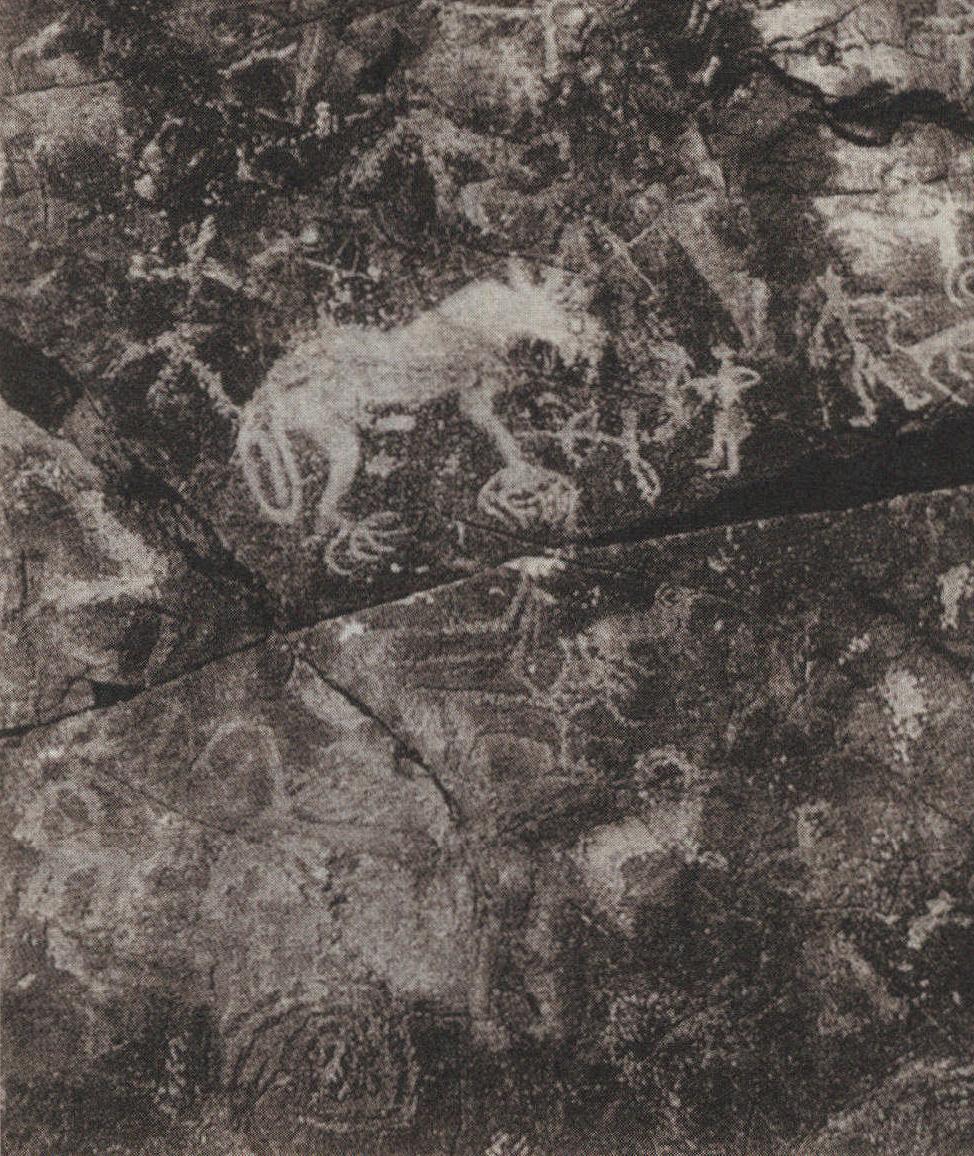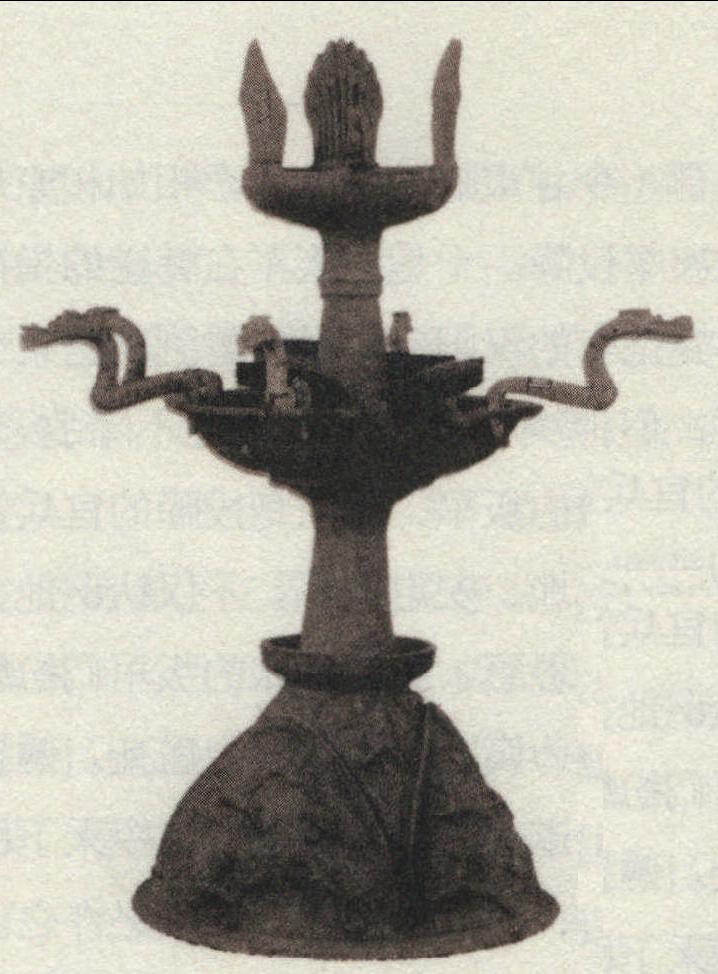傅 燮 (? ~187),东汉官吏。字幼起,后改字南容。西汉义阳侯傅介子后裔。东汉北地郡灵州 (今宁夏吴忠市利通区境内)人。傅燮在少年时期就努力学习,苦练武功,被家乡父老乡亲公认为是一个有文才武略的人,向朝廷推举他为优秀后备人才,即“举孝廉” ,不久就担任北地郡将。当时灵州一带居住着许多少数民族,为反抗官府的压迫与剥削,以羌族人为首,不断发动起义斗争。傅燮是本地人,自幼就了解少数民族的疾苦,所以他上任后,没有采取前任官员的镇压手段,而是尽量抚恤羌人,组织他们开荒种田进行生产自救。渐渐流亡的乡民和盘踞山林的少数民族“怀其恩化,并来降附” ,很快就使动乱的北地郡基本上安定下来,各族人民和睦共处,在一定程度上过着安居乐业的生活。

匈奴人岩画
Rock Carvings of the Xiongnu Nationality
中平元年(184)二月,张角领导的黄巾农民大起义爆发,傅燮这时已经升任为护军司马的高职。他被调跟随左右中郎将皇甫嵩、朱㑺开赴河南颍川(今河南东南部)等地镇压农民军。傅燮所部虽然屡建战功,但因为不与当时在朝中专权的宦官张让、赵忠之流为伍,所以在战事平定之后,大家都有升赏,唯独他有功无赏,仍被调回安定郡 (今宁夏固原)任都尉,不久又说他的身体有病,不能胜任而被免了职。由于黄巾起义的缘故,西北官兵大批东调,防务一时空虚,于是北地郡境内的先零羌和枹罕 (今甘肃临夏)、河关 (今青海贵德境内)等处羌胡少数民族,推举胡人北宫伯玉为首领,乘机举兵反叛。民族军拥戴金城(今甘肃兰州)名士边章、韩遂为军政正副总指挥,积极开展攻城略地,杀金城太守陈懿、护羌校尉冷征等地方官员,使得今甘肃省境内大部分地区成为民族军的天下。当时宰相崔烈极力主张放弃甘肃一带,后退防守,但遭到新任议郎傅燮的坚决反对,而未能实施。当朝的文武大臣们,都对傅燮敢于当着皇帝的面直言并对抗首辅而感到十分敬畏。
中平四年 (187),因傅燮仍然拒绝专权宦官赵忠等一伙的拉拢和不向权奸们行贿,又被排挤出京师,被调往民族军最为活跃地区的汉阳 (今甘肃甘谷东)任太守,这一着显然是在企图借刀杀人。这时陇西郡(今甘肃临洮)太守李相如和凉州刺史耿鄙等地方高官都已先后向民族军投降。于是民族军在韩遂的指挥下,集中十多万人马,全力进攻傅燮据守的汉阳。傅虽然看到自己兵少粮缺,城破不过只是一个时间问题,但他决心以死殉节,绝不降敌,并日夜亲自登城与将士们并肩战斗。围城的叛军,不论是投降的官兵,还是民族军,因为其中许多人都是来自北地、安定两郡,不仅认识他,而且还感念他的治边德政和对少数民族的恩惠。所以围城的叛军们纷纷在城下给他叩头,请求他弃城还乡,不要为腐败的朝廷白白送死。傅燮的儿子傅干也跪地哭求说: “国家昏乱,遂令大人不容于朝。今天下已叛,而兵不足自守。乡里羌胡,先被恩德,欲令弃郡而归,顾必许之。不若徐至乡里,率厉义徒,见有道而辅之,以救天下。”傅燮长叹一声后对儿子说: “别成 (傅干小名),你知必死邪! 古人言 ‘圣达节,次守节’ 。且殷纣之暴,伯夷不食周粟而死,仲尼称其贤。今朝廷不甚殷纣,吾德岂绝伯夷?世乱不能养浩然之志,食禄又欲避其难乎? 吾行何之,必死于此。”说完话他命令打开城门,亲自指挥守城的饥饿疲惫之师冲向敌人,而死于战斗之中。后来朝廷追封他为壮节侯。

东汉贵族家庭使用的陶灯
Pottery Lamp for noble family use in Eastern Han Dynasty
灵州傅氏家族是北地郡的一大望族,傅家的祖先,远可以追溯到殷商王武丁时代,曾辅佐王室实现中兴大业的名臣傅说。后来到了西汉时期,又出现了义阳侯傅介子、高武侯傅善、孔乡侯傅晏、汝昌侯傅商、昆阳侯傅俊和东汉初的文学博士傅毅等。在傅燮的后世,傅家子孙渐渐散居到内地和江南,仍然是代有名人出。傅燮的儿子傅干曾担任过扶风(今陕西兴平东)太守。孙子傅玄是魏晋之交著名的思想家、哲学家、政治家和诗人、文学家。曾在曹魏期间当过弘农太守、典农校尉。司马氏掌权后,被封为男爵和子爵,加驸马都尉,担任过御史中丞、太仆司隶校尉等要职。死后追封为清泉侯。傅玄完成的著作,内容十分丰富,但大多数已经散失了,现有《傅子》文集传世。再往后世,傅家涌现出的名人还有三国时代的文学家傅巽、学者傅嘏; 西晋时代的名臣傅咸、傅畅; 南朝宋廷的宰相傅亮、宁朔将军傅弘之、御史中丞傅隆,南朝齐廷的庐陵王傅琰,南朝梁廷的南平侯傅岐、尚书傅昭,南朝陈廷的撰史学士傅缚、度支尚书傅准等。隋唐以后,傅氏家族枝叶繁衍,遍布江河南北,大多数族人已丢弃了乡籍,宗亲见面已不再相识、相认。
Fu Xie (?-187),an official of the Eastern Han Dynasty,styled as Youqi orNanrong,was a descendant of Fu Jiezi,Marquis of Yiyang in the Western Han Dynasty. Fu Xie was a native of Lingzhou in Beidi Prefecture (present-dayLitong District of Wuzhong City in Ningxia). Since his early youth,he studied hard and applied himself to wushu. All his follow villagers thereupon acknowledged him as a good young man who was adept in both pen and sword. They recommended him to the imperial government as an excellent reserve talent when they were required to recommend the filial,honest and upright young people to the court. And it was not long before Fu Xie became the general of Beidi Prefecture. People of many minority nationalities who lived in Lingzhou area then continuously rose in revolt against the oppression and exploitation of the local authorities under the leadership of the Qiangs.As a native of Lingzhou,Fu Xie knew the minority nationality people's sufferings very well. Therefore,unlike the former officials in Lingzhou,he didn't adopt the armed suppression of Qiangs,but comforted them instead after he assumed the office. He helped them reclaim wasteland and engage in production for their own salvation. Due to his kindness,more and more villagers in exile and the minority people living in the wooded mountain areas attached themselves to Fu Xie voluntarily,which enabled the turbulent Beidi Prefecture to regain stability quickly and people of different nationalities to live in harmony and contentment to a certain degree.
February,the first year of the Zhongping reign (184 A.D.) saw the breakout of Huangjin peasant uprising under the leadership of Zhang Jiao. Fu Xie was then the military minister. He was transferred to Yingchuan in Henan (southeast Henan Province today) to help general,Huangfu Song and vice general,Zhu Jun put down the peasant uprising. Although Fu Xie's troops distinguished themseLues in action,all officials but him were rewarded with power and money after the fighting because he refused to associate with the eunuchs,Zhang Rang and Zhao Zhong,and their like who arrogated all state powers to themseLues in the court. Fu Xie was still the Duwei (a provincial governor in ancient China) of Anding Prefecture (present-day Guyuan in Ningxia),and it was not long before he was relieved of the post on the excuse of his incompetence because of his illness. At that time,large numbers of government troops in the northwest moved to the east to suppress Huangjin peasant uprising,as a result of which,the northwest was weakly defended. Some minority nationality people,such as the Qiangs in Beidi Prefecture and the Qiangs and Hus in Baohan (present-day Linxia in Gansu Province) and Heguan (present-day Guide in Qinghai Province),seized the opportunity to call out the troops in revolt. The minority army elected Beigong Boyu,a Hu person,as their leader and supported the celebrities Bian Zhang and Han Sui in Jincheng (present-day Lanzhou City in Gansu Province) as commander and vice commander respectively. The minority army attacked cities,seized territories and killedsome local officials,such as Chen Yi,the prefect of Jincheng,and Leng Zheng,the field officer in the Qiangs' settlement. And they became masters of the greater part of Gansu Province quickly. Cui Lie,Prime Minister at that time,advocated that the government troops should give up Gansu and draw the line of defense back. But he failed to put his thoughts into effect because his strategy received a strong opposition from the newly appointed yilang (an official in ancient China),Fu Xie. The other civil and military officials in the court feared for Fu Xie's outspoken remarks against the chief official in the presence of the emperor.
In the fourth year of the Zhongping reign (187 A.D.),Fu Xie was squeezed out of the capital because he still refused to follow and bribe the eunuch Zhao Zhong and his followers. Obviously,Zhao Zhong tried to get rid of Fu Xie through the minority army's hands when he appointed Fu Xie as prefect of Hanyang (east Gangu in Gansu Province today),where the minority forces were the strongest in the whole country. Li Xiangru,prefect of Longxi Prefecture (present-day Lintao in Gansu Province),and Geng Bi,cishi (an official handling procuratorial affairs in a prefecture on behalf of the central government in ancient China) of Liangzhou,had already surrendered to the minority army. Therefore,the minority army,taking Han Sui as their commander,gave all-out attack to Hanyang guarded by Fu Xie and his troops. Fu Xie knew very well the day the city fell would come sooner or later because it was running out of soldiers and provisions. Nevertheless,he was determined to die in loyalty to his country. He fought against the rebel army shoulder to shoulder with his officers and soldiers day and night. Most members of the rebel army besieging the city,whether the government soldiers who had already surrendered to the minority army or the rebel troops themselves,came form Beijun and An'ding prefectures. They not only knew Fu Xie,but also remembered with gratitude his kindness to the minority people in the borderland. Therefore,they kowtowed outside the city begging Fu Xie not to die for the corrupt court but to give up the city and return to his native land. Fu Gan,Fu Xie's son,also knelt down to beg him crying,"Dad,the emperor is muddle-headed and the country is in chaos. You have already been forced out of the capital. Now,so many people have risen in revolt and the number of our hands is not enough to defend the city. If you give up the city,I'm sure the Qiangs and the Hus will allow us to return to our hometown because of your kindness to them in the past. You can call out some chivalrous people in our native place and assist a wise man in governing the country and save the common people in the whole country." Fu Xie heaved a sigh and said to his son,"Biecheng (Fu Gan's pet name),you said those because you know we will die definitely. Don't you know the old maxim 'the saint creates the moral integrity for us to follow'? Emperor Zhou,the last ruler of the Shang Dynasty (1600-1046 B. C.),was very cruel,but Bo Yi (an official of the Shang Dynasty) would rather starve to death than eat anything offered by the Zhou Dynasty (1046-256 B. C). Zhongni (the style name of Confucius) considered him as a person of virtue. Since the emperor is not so savage as Emperor Zhou,how should I be less loyal to the court than was Bo Yi? I'm clear that the noble spirit is too far for us to reach in these turbulent years. But since I get emoluments from the court,how can I try to neglect my duty to help our country out of the difficulties? I'm ready to fight to death." And then,he ordered his men to open the city gate and commanded his troops who were both hungry and tired to charge to the enemy. Fu Xie finally died in the fighting and was posthumously admitted as the Marquis of Virtue.
The Fu family in Lingzhou was a distinguished one in Beidi Prefecture. Thehistory of this family could be traced back to Fu Yue,a famous official during the reign of Emperor Wuding of the Shang Dynasty,who had ever helped the emperor accomplish the restoration of the dynasty. Fu Xie's ancestors also included some distinguished figures in the Western Han Dynasty,such as Fu Jiezi,Marquis of Yiyang,Fu Shan,Marquis of Gaowu,Fu Yan,Marquis of Kongxiang,Fu Shang,Marquis of Ruchang and Fu Jun,Marquis of Kongyang,and others in the Eastern Han Dynasty like Fu Yi,a court academician of letters. Fu Xie's descendants gradually lived scattered inland or in the south of China,among whom still appeared many celebrities in each generation. For example,Fu Gan,Fu Xie's son,had ever been the prefect of Fufeng(east Xingping in Shaanxi Province today). And Fu Xuan,his grandson,was a famous thinker,philosopher,statesman,poet and man of letters when the Wei Kingdom (220-265) gave way to the Jin Dynasty (265-420). He had ever been the prefect of Hongnong and the field officer of Diannong in the Cao Wei Kingdom,and was made a baron and viscount later when the Sima family wielded the state power of Wei. He also had ever held some important posts,such as fumaduwei(emperor's son-in-law as governor),yushizhongcheng(senior officer next to the prime minister) and silixiaowei (a high-ranking official in ancient China) and was posthumously confirmed as Marquis ofQingquan. Fu Xuan's works were rich in content,most of which were lost unfortunately. But Fu Zi,his collected works,has been handed down to posterity.Many celebrities of the Fu family also appeared in later generations,such as Fu Xun,a famous man of letters and Fu Gu,a learned scholar during the Three Kingdoms Period(220-265),Fu Xian and Fu Chang,renowned officials in the Western Jin Dynasty(265-316),Fu Liang,Prime Minister,Fu Hongzhi,Ningshuo General and Fu Long,yushzhongcheni in the Song Dynasty (420-479) of the Southern Dynasties (420-589),Fu Yan,Luling Duke in the Qi Dynasty (479-502) of the Southern Dynasties,Fu Qi and Fu Zhao,Marquis of Nanping and imperial secretary respectively in the Liang Dynasty (502-557) of the Southern Dynasties,Fu Fu and Fu Zhun,a scholar in charge of history recording and a duzhi minister respectively in the Chen Dynasty (557-589)of the Southern Dynasties. Descendents of the Fu family,after the Sui Dynasty (581-618) and the Tang Dynasty (618-907),could be found all over the country. And most of them forgot their real native place and could not recognize each other when theymet.Ⓔ
本文地址: https://www.yishiweijian.com/renwu/2022123782.html
文章来源:主编
版权声明:除非特别标注,否则均为本站原创文章,转载时请以链接形式注明文章出处。
2023-02-15主编
2023-02-15主编
2023-02-15主编
2023-02-15主编
2023-02-15主编
2023-02-15主编
2023-02-15主编
2023-02-15主编
2023-02-15主编
2023-02-15主编
2022-11-29主编
2022-11-29主编
2022-11-23主编
2022-11-18主编
2022-12-08主编
2022-12-08主编
2022-12-02主编
2022-11-29主编
2022-11-29主编
2023-01-03主编
2022-10-27主编
2022-10-27主编
2022-10-27主编
2022-10-27主编
2022-10-26主编
2022-10-27主编
2022-10-26主编
2022-10-26主编
2022-10-27主编
2022-10-27主编
扫码二维码
获取最新动态
